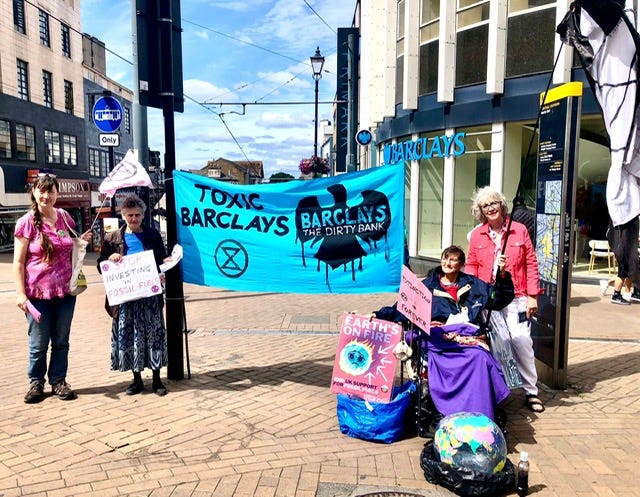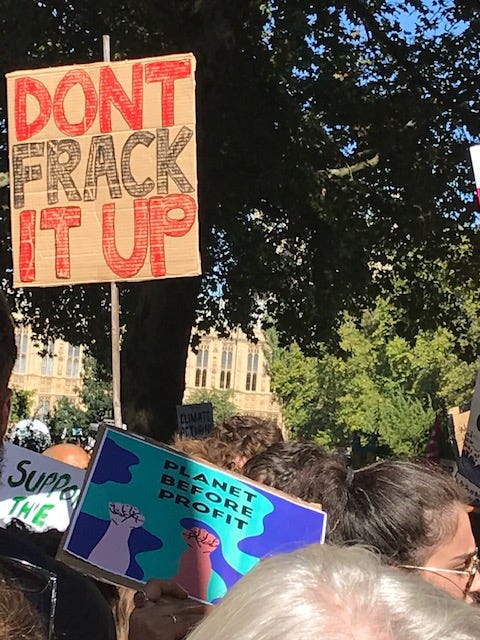Proposing a Deliberate Re-think of the Profit Motive for The Fossil Fuel Industry
Ideas for working backwards from follow the money, to Unfollow The Money
Dear Humans of Planet Earth,
I hadn’t heard of Jackdaw, the project Barclays is financing, till I saw these four women in the photo, protesting outside of Barclays in Croydon. And I’ve been thinking about their protest ever since.
Many people wouldn’t want to show up to a protest of four. It’s not big enough to make the news in a big way, but perhaps people stopped to chat with them. Perhaps ten or twelve Croydonians went home and like me, couldn’t stop thinking about these four women protesting Barclays’ financing of Jackdaw.
Here’s a bit more on Jackdaw: Climate activists vow to fight as new gasfield gets go-ahead in North Sea | Gas | The Guardian
I hear you though. You’re saying, If Barclays didn’t finance them, someone else would.
A thought experiment
And so we begin our thought experiment. Be brave and come with me. Think the impossible and let’s see if anything credible emerges.
What if the UK banned all British banks from financing fossil fuel companies? Not that they would, given that their energy policy embraces local production in the medium term. But we’re allowing ourselves to think the impossible, so don’t let the present reality stop you. Reality, after all, is the enemy of imagination!
Well, you say, if British banks can’t do it, non-British banks would finance the fossil fuel companies. You are correct.
What if all international banks were banned from financing fossil fuel companies?
Well, you say, in theory, private individual investors might finance them instead but the impact of Russia’s land invasion of Ukraine shows it’s not as simple as reducing supply. Withdrawing all finance at once would cause the price of oil and gas to explode, as shareholders would withdraw their investments since future business would seem precarious. Private investors might step in. But with the industry about to collapse, they might not. The risk of social collapse would push governments to reverse the financing ban, just as Macron was pushed to reverse his hike in fuel prices in response to furious, unrelenting protests of the now famous gilets jaunes.

We haven’t got the replacement infrastructure yet for shutting down fossil fuels anywhere in the world. The UK’s done well to replace carbon-based fuels with renewables and nuclear energy, and though progress has been significant and better than many other places, the grid is far from carbon-free.
Even if we were to pass an internationally agreed radical law banning the production of non-essential goods, essential goods still rely on fossil fuels for their production and transport. We’re talking about food here, for starters.
This is why the candidates for UK leadership of The Conservative Party advocate a slow but steady transition to get to Net Zero. They believe any attempt at radical transition would lead to economic and social chaos. They fear anarchy.
Several have hinted at weakening key policies, such as green levies on energy bills, which Liz Truss and Penny Mordaunt said they would scrap, or at holding back on climate action.
Rishi Sunak warned in the televised debate on Sunday night against going “too hard and too fast” on climate action. Tom Tugendhat appeared to pin his hopes on carbon capture and storage, which experts have said can play only a minor role in reducing greenhouse gas emissions. - Source
Ironically, climate activists fear anarchy too. Climate breakdown leads to climate catastrophe and economic and social breakdown. When people have neither food nor fuel, neither jobs nor savings and no hope of this changing because governments can’t magic away the physics of a climate running away past the tipping points we’ve been warned about for decades, that’s your premise for anarchy right there.
Conservatives believe we should prioritise economic stability and therefore transition slowly.
Climate scientists agree slow transition would have been perfect in the 1990’s when they were advocating it, but we’ve long since lost that window of opportunity. Today, they believe a refusal to transition aggressively will lead to climate collapse. Climate collapse means no civilisation as we know it and definitely no macro-economy. Instead, we’ll be bartering skills and scarce resources and hoping we and our families will survive another week.
Okay, I’ve said that two different ways now. Let’s take a deep breath and continue.
Are we fucked either way?
Here’s our first stop on this thought experiment:
Stop #1 we can’t stop the burning of all oil and gas overnight without creating the conditions for anarchy and death and we can’t halt investment in fossil fuels overnight either.
But if we need to go fast, what can we do?
We could accelerate the transition away from fossil fuels by reducing investment in a phased way, enforced by law. International laws are gentleman’s agreements that the wealthy or powerful nations break when it suits them. Still, the motive is there for doing this.
The only losers are those invested in ongoing profit from fossil fuels.
Politicians will be quick to tell us we’ll all lose, because your private and state pensions and government bonds are invested in the wider market - and fossil fuels are part of that market.
Don’t feel hopeless, because now we’re getting somewhere
Stop #2: Break the profit motive without breaking the industry. Break it with incentives to move to renewables and international agreements. Re-make it so it serves the transition, rather than undermines it.
How?
Here’s a framework for breaking the profit motive:
Make it impossible to buy new shares in fossil fuel companies.
Make it impossible to sell shares in fossil fuel companies overnight, to prevent a run on the companies. Instead, all except the smallest shareholders can sell a fixed and limited number of shares annually, so reducing their investment over time. Very small shareholders can sell overnight, as long as together they hold a minority of total shares and their withdrawal won’t crash the companies.
Cap the price per barrel or litre of fossil fuels by exporter countries and cap the prices on refined products. This prevents the skyrocketing of prices that governments fear.
Give a financial incentive to shareholders switching their investments from oil and gas to approved renewables. The decisions as to which renewables are acceptable needs to be made not by business, but by international organisations advised by scientists, the types that have been around for decades giving evidence-based advice, not some faux organisation with an innocent sounding name, set up by investors overnight for the purpose of gaming the system.
Disallow massive profiteering within the oil and gas industry. Keep and continue to pay the engineers and other technical folks whose responsibility is to ensure safety in the extraction and delivery process. Shareholders are put on notice that the size of their dividends will be capped and reduced on an annual basis. To reduce this sum to zero would be unfair.
Shareholders who willingly re-invest all their dividends into approved renewable industry are rewarded with a financial incentive.
The oil and gas industry begins to wind down as a result and the move to renewables accelerates.
This radical system is put in place because we have a climate emergency and willingly annihilating our own species is a bigger injustice than helping the stubborn fossil fuel industry and its investors speed up their reluctant transition.
It’s a bit like the Covid crisis. Businesses may have lost some money but the trade off is that lives were saved. The alternative to radical intervention is to lose our global economy and civilisation as we know it.
Stop #3
This is actually a pre-requisite to Stop #2. Accept that in a climate emergency, unusual actions are required.
If there’s a fire in your house or flood waters are rising on your street, or a child has just been hit by a speeding car, you don’t say, ‘Let me finish my coffee and I’ll think about it after I’ve washed the cup and brushed my teeth and showered.’
Stop #4 follows Stop#3. Put leaders in place who are willing to lead on the climate emergency. Leading isn’t waiting around. Sure, all governments won’t realise what they have to do at the same time. At the global level, someone, or somebodies, have to lay out this vision and build the commitment to take us to Stop#2.
We understand Stop#1. It’s time to move past it.
With Love,
Your Friendly Neighbourhood Radical,
Croydon,
London,
That patch of earth known today as the United Kingdom
Lat +51.51 Long, -0.118
PS how’s this for a hashtag? #DefundFossilFuelsSaveUsFromAnarchy
I think it could catch on





